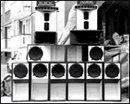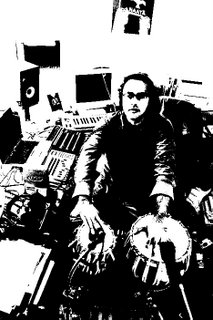
Sonic Dominance, the Demise of Vinyl, the Mathematics of Bass, and Echoes of “Batty Bwoy” Lyrics in my Head:
Some Disparate, Disconnected, Dubbed Thoughts on the Power of Music
On a recent wander through the shuffle mode of my iPod my ears landed in the middle of a song from an album long lost in another shuffle – that of my CD library. “Bass is Maternal” from Smith & Mighty is a breakbeat dub jaunt through the early 1990s
The warmth of bass and its all-encompassing experiential quality have been at the core of many key moments in my and countless others’ everyday experiences. One need only take a quick look at the world of blogs to see its importance.
Khenu recently contributed some reflections “on the nourishing, restorative effects of music and on the various shades of our psychological response to sound and rhythm…”
No doubt, the variegated qualities of sound represent an abiding theme of root and wires.
It is in the spirit of contributing to this thread of musical thought that I run through the following disparate ideas sufficiently open ended for your comments…
>>>>>>>
Julian Henriques writes in his article “Sonic Dominance and the Reggae Sound System Session,”
“Sonic dominance occurs when and where the sonic medium displaces the usual or normal dominance of the visual medium. With sonic dominance sound has a near monopoly of attention. The aural sensory modality becomes the sensory modality rather than one among the others of seeing, smelling, touching and tasting.”
For Henriques the reggae sound system is not only his favorite site to experience sonic dominance, with which I concur, but also the epistemic example of this phenomenon:
“The first thing that strikes you in a Reggae sound system session is the sound itself. The sheer physical force, volume, weight and mass of it. Sonic dominance is hard, extreme, and excessive. At the same time the sound is soft and embracing and it makes for an enveloping, immersive and intense experience. The sound pervades, or even invades the body, like smell. Sonic dominance is both a near over-load of sound and a super saturation of sound.”
For those who have experienced a roots reggae sound system in action it is a feeling like no other. Personally, my encounters with sounds such as Jah Shaka and Entebbe have completely rewired my ears such that even if I listen to music at low volumes sonic dominance is implied. Is this akin to the sensory magnification a blind person may feel as hearing becomes their predominant sense? I like to think so.
The predominant format with which sound systems convey sonic dominance has been the dub plate and vinyl record. Time will tell if the eminent demise of the petroleum by-products used to produce LPs will change this…which brings me to another musical matter on which my ears have been meditating...
>>>>>>>>
This fall I completed a huge project of ripping upwards of 18,000 songs from compact discs to external hard drive and subsequently to an iPod. I am old enough to have experienced every format from LPs To 8-tracks, cassettes to CDs. As such, the novelty of having immediate access to such a sheer quantity of music in the palm of my hand is nothing short of amazing. However, I cannot help but feel a pang of nostalgia for the touch of the CDs and LPs that get a bit less attention as I patch my iPod in and press play. And the sound? Is it the same? With each listen I strain while trying to discern a difference. What has your experience been with this?
>>>>>>>>
The second low-end modality I have been navigating over the course of the last three months is playing bass. I commenced with the process of taking bass lessons in late August. My relationship to and interest in music up to this point in my life has always been one of feeling, emotions, tones, textures, and historical contexts. Since taking bass lessons, I have come to a greater appreciation of music’s connection to mathematics. The tyranny of a metronome teaches you this quickly. Tyranny is too strong a word, for indeed, timing in music is a meditation of sorts. I wake up every morning before work at approximately 5:30 AM. I proceed to strap on my lovely Fender J-Bass and finger pick away. As I roll through the exercises, the previous night’s sleep washes away and the rhythm takes over. The process is frustrating at times, but grounding and calming at its core. I am reminded of Khenu’s mention of the mathematician Pythagorus in his blog post of 19 October. No doubt, as I crack the mathematical code of Louis Bellson’s Modern Reading Text in 4/4 I can see what Pythagorus’s disciples were getting at when they “employed music as medicine, with certain melodies composed to cure the passion of the psyche, as well as ones for despondency and mental anguish.”
>>>>>>>>>
Music also renders its power in the field of culture. In between the ripping of CDs and the playing of bass I have been working on my masters thesis in media studies. I am attempting to analyze the narratives that various claimsmakers utilize in the current global debate over the presence of homophobic lyrics in dancehall reggae. By claimsmakers I am referring to individuals who or organizations that have a vested interest in influencing the debate whether they may be against such lyrics or apologists for the artists that sing the contested songs. This subject is not new to most readers here. However, I perceive a large gap in the current discourse. Too much of the current debate is based on staid narratives that do not open up cross-cultural dialogue. Groups like OutRage often carry on certain racist assumptions that mirror colonial narratives of the past. Meanwhile, some in the so-called reggae fraternity cling to conspiracy narratives that perpetuate a “Naw Bow” position. Ultimately, both sides digress into what Carolyn Cooper characterizes as a “border clash.” I see the opening of a more nuanced cross-cultural dialogue as central to the process of ameliorating the situation for gay and lesbian Jamaicans and, indeed, all homosexuals who are adversely affected by lyrical calls for their death. This will require a much more far-reaching dialogue than is currently being engaged.
A blog for another day….
What is your opinion on the nature of this debate?
>>>>
Post-script: All lovers of heavy Drum and Bass Rub-a-Dub styles must check Mr. Spaulind’s “Twelve Tribes of Israel.” The dub chamber selection of the week! Go Deh!!
Peace,
Andy G
Roots and Wires Set and Sound

